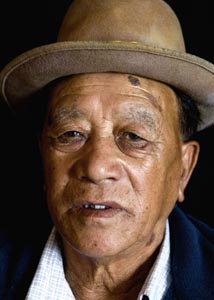Name: Lhakpa
(Alias: No)
Gender: Male
Interview Age: 81
Date of Birth: 1921
Birthplace: Kyirong Magal, Utsang, Tibet
Year Left Tibet: 1960
Profession: Farming
Monk/Nun: No
Political Prisoner: No

Interview No.: 69D
Date: 2012-05-22
Language: Tibetan
Location: Mcleod Ganj, Dharamsala, Himachal Pradesh, India
Categories: Buddhist Traditions
Keywords: Buddhist beliefs, Chinese -- first appearance of, customs/traditions, escape experiences, shamans/mediums, taxes, Utsang
Summary:
Lhakpa was born in the village of Kyirong Magal and recounts that his family owned 40-50 animals, worked in the fields and performed government tasks as a form of tax. He talks about keeping horses ready for the atung 'postman' who came to deliver letters from the government. He recalls taking food to the ngagpa 'shamans' and monks that lived on retreat in caverns in the mountains. The villagers requested help from ngagpa during times of drought and other difficulties. The ngagpa were known for being able to start or stop rain.
Lhakpa travelled to Lhasa at age 25 to visit relatives and go on pilgrimage to monasteries. Upon returning to his village he witnessed how the Chinese initially tricked the Tibetans with dhayen 'silver coins' and helped the villagers, then later harassed and imprisoned them. Many influential Tibetans fled at this time, including Lhakpa's family, but he chose to stay in the village in order to fulfill a promise he had made to the manager of the local monastery.
Lhakpa relates that he was selected to stay in Tibet until he and two others were able to safely escort the sacred Kyirong Jowo 'statue of Buddha Sakyamuni' from his village's monastery to Nepal. He gives a detailed account of the planning, the replacement of the statue with a fake one and the execution of the dangerous mission. He explains that the fear of the holy icon being smuggled to China compelled them to embark on this plan. His journey ends with the Jowo safely in Nepal. Later the Jowo was brought to India by plane and installed in Dharamsala.
Interview Team:
- Rebecca Novick (Interviewer)
- Ronny Novick (Videographer)
- Thupten Kelsang Dakpa (Interpreter)

